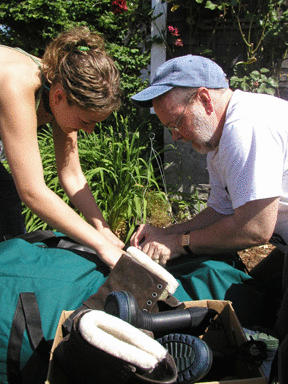It may be a camp in Siberia, but it is anything but a prison.
Instead, the one-acre facility in the countryside outside Novosibirsk is a place for Bainbridge youths to improve the lives of a few Russian children.
Fifteen high school students departed Monday for Camp Siberia, where they will spend three weeks as counselors for children from two Russian orphanages.
“Bonding with the children of another country is phenomenal,” said Jane Brinkley, one of five students from last year’s group who are returning to the camp.
Rob Spenser, another of the first Bainbridge students to travel to the camp, agreed that the experience was life-changing.
“I think it was so powerful because no one knew what to expect,” said Spenser, who views the experience as “the key that unlocked the door” to his interest in other cultures.
Each student is paired with an orphan for three busy days of sports, arts and crafts.
Although few of his fellow counselors speak much Russian, Spenser said they relied very little on the translators.
“You find that what you want to say you don’t need to express verbally,” he said. “It’s 10 times better not to have to use words.”
Inspiration
Camp Siberia was the brainchild of islander Janie Ekberg, who first travelled to Siberia in 1990 as part of a theater exchange organized by Bainbridge Performing Arts.
“When they first asked me to go, I said, ‘Are you crazy?’ I didn’t have any interest in Russia,” she said. “Now, I think I’m half Russian.”
Over the next decade, Ekberg returned regularly to Siberia to work with children there, eventually purchasing an acre of land in the countryside outside Novosibirsk to build the camp facility.
To cover their travel costs, each student raised $2,700 – funds that also bought train fare for two of the orphans to take the hour-and-a-half train ride from Novosibirsk.
The students also solicited donations of clothing, food and equipment from local businesses, like Churchmouse Yarns & Teas, whose knitting group assembled more than 100 hats, scarves and sweaters to send to the orphans.
Almost half a ton of supplies, ranging from large duffel bags full of boots to art supplies to cases of peanut butter, was shipped off with the students.
But the value of the camp is as much in the presence of the students as what they bring with them, says Ekberg.
“It’s not that you bring the medicine and the money,” she said, “it’s the fact that we come back to Russia year after year.”
Equally valuable are the experiences that the students, who return to the United States on July 12, bring back with them.
“It gave me perspective on how big my life seems to me, and how small it really is,” said Spenser. “And although it is so small, it can still make a difference in other lives.”



